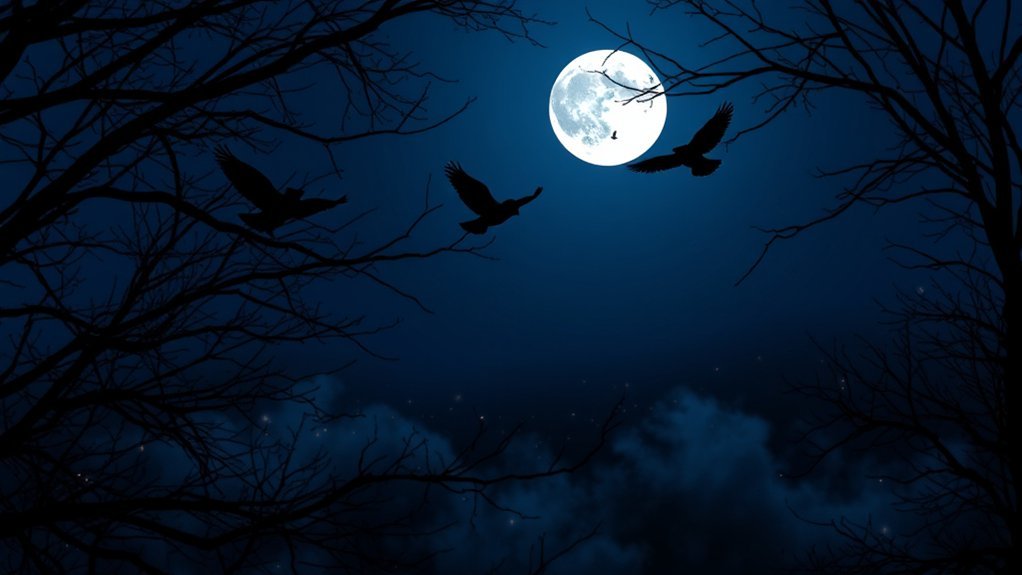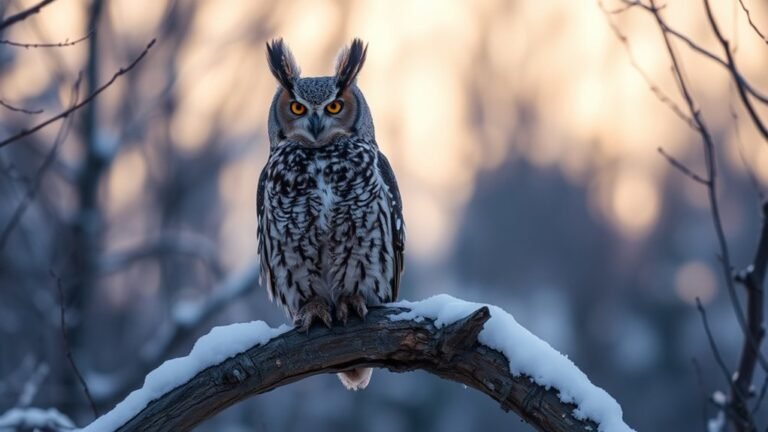Do Birds Fly at Night? Exploring Nocturnal Behavior
Some birds are awake and active at night. These birds have special skills that help them live in the dark. They can see well and hear sounds that we might miss. Learning about how these birds behave at night shows us how they survive and what part they play in nature.
But being active at night isn't easy. Many places are brighter now because of lights. This can make it hard for these night birds. They must find ways to stay safe and find food in a world that is changing fast.
So, let's explore more about these amazing night-time birds!
A Quick Overview
Many birds, like owls and some songbirds, are active at night. They fly around to hunt and socialize. These birds have special skills, like great night vision and sharp hearing, which help them see and hear in the dark.
Being awake at night helps them find food easily. They can catch many insects and small animals that come out after the sun goes down.
Light pollution, which is too much artificial light at night, can confuse these birds. It can mess up their routines, migration paths, and mating calls.
If you go birdwatching at night, you might see some amazing bird behaviors. The best time is during twilight or right after it gets dark. It can be a really fun experience to see how these birds live after sunset!
Understanding Nocturnal Birds

Nocturnal birds are interesting creatures that have special skills to help them live successfully in the night. They're great at hunting for food in the dark. They use their sharp hearing and special eyesight to find and catch prey.
For example, owls have ears that aren't the same size. This helps them figure out where sounds come from, making it easier to hunt.
At night, these birds also communicate with each other using quiet calls. These sounds help them mark their territory and find mates. By adjusting to the sounds of the night, they build connections with other birds.
These skills help nocturnal birds survive in dark environments. Learning about them shows us how cool and unique these birds are!
The Advantages of Nighttime Activity
Many birds are busy flying around during the day, but some take to the skies at night. These nighttime birds have special advantages that help them get what they need to survive.
One big advantage is that there are fewer birds looking for food at night. This means they've less competition. When it gets dark, many insects and small animals come out to play. These birds can catch these tasty snacks easily because their daytime neighbors are asleep.
Another perk of flying at night is the cool temperatures. Nighttime can help birds save energy when they're hunting. This way, they can stay active and find food without getting too tired.
Being active at night also helps these birds find a unique spot in nature. They can live in different places and make the most of their surroundings.
Common Nocturnal Bird Species

Many birds are active at night and have special features that help them survive. Owls are the most well-known among these nighttime birds. They've great night vision and can fly quietly, which helps them catch their prey.
Another interesting bird is the nightjar. Nightjars have special habits that help them feed in the dark. They blend in with their surroundings, making it harder for predators to spot them.
Some birds travel in the evening. They use soft songs to communicate with each other and find their way.
Owls are strong hunters that thrive at night. Nightjars have adapted to live in low-light conditions. These birds play important roles in nighttime environments.
Learning about these birds helps us appreciate how nature works.
How Birds Navigate in the Dark
How do birds find their way in the dark? They use their special eyes and ears.
Birds like owls can see well at night because their eyes take in a lot of light. They've more rods in their eyes than humans do. These rods help them see shadows and movement better when it's dark.
Many birds that fly at night also listen closely. They've sharp hearing that helps them hear sounds in their surroundings. This helps them avoid things in their way and find food.
These skills let birds move safely in the dark and connect with the night life around them. It's pretty amazing how nature helps them thrive when the sun goes down!
Adaptations for Nighttime Hunting

Many birds have special skills that help them hunt well at night. These skills help them find food when it's dark outside.
- Great hearing: Many of these birds can hear sounds better than humans. This helps them find their prey even if they can't see it.
- Quiet flying: Birds like owls have feathers that make no noise when they fly. This lets them sneak up on their food without being noticed.
- Big eyes: These birds often have larger eyes. Big eyes help them see better in low light, making it easier to spot their dinner.
All these skills work together. They help these birds become strong nighttime hunters, making sure they find food and survive when many other animals are sleeping.
The Role of Vision in Nocturnal Birds
Nocturnal birds, like owls, are great at hearing sounds in the dark. But their vision is also really important for finding food at night. They've special features that help them see in low light. For example, their eyes have a lot of rod cells. These rod cells help them see better when it's dark.
Owls and other nocturnal birds have big eyes that can gather more light. This helps them move around and hunt better at night. Some of these birds even have a shiny layer behind their retinas called the tapetum lucidum. This layer makes their night vision even better by reflecting light.
With all these cool traits, nocturnal birds can do well in dark places. They thrive in the night and have exciting adventures.
The Importance of Hearing and Echolocation
Nocturnal birds rely on their hearing for survival in the dark. Their ears are specially adapted to pick up sounds that we often miss. This ability helps them find food, navigate their surroundings, and talk to each other when it's hard to see.
- Their ear structure helps them tell where sounds come from.
- Many birds use sound to attract mates and establish their territory.
- Some birds can use echolocation, which helps them find their way and locate prey.
Learning about how these birds hear can help us appreciate their nighttime lives. They skillfully understand sounds around them, showing how they adapt to thrive in the dark.
Understanding this makes us better appreciate their unique world at night.
Social Behavior Among Nocturnal Birds
Nocturnal birds have interesting social habits that connect with how they make sounds. These birds form groups that help them stay safe from predators. You might hear them making calls to attract mates and to help each other find food.
When they want to mate, their calls become really important. They can mark their territory and attract partners with loud sounds.
These social behaviors show how they balance their own needs with the needs of their group. By looking closely at these patterns, you can see how these birds manage to live well in the dark and build strong bonds with one another.
Learning about their lives can make us appreciate how they thrive in the night.
Environmental Factors Influencing Activity
Environmental factors greatly influence when and how birds are active at night. Observing different birds can help you see how their homes and the changing seasons affect their behaviors. Each environment gives birds different resources and challenges, leading to unique activity patterns.
- Different Habitats: Birds live in many types of places. Some spots have lots of food while others may have more danger. This affects whether birds will fly at night or not.
- Season Changes: As temperatures rise and days get longer, birds might be more active at night. These changes can change how fast birds use their energy and how they search for food.
- Weather Effects: Rain, wind, and temperature changes can make it harder for birds to see or find food. This can help birds decide if they want to be active at night.
Understanding these factors can help you appreciate birds and their behaviors even more!
The Impact of Light Pollution
Light pollution really affects birds, especially at night. In cities, bright lights change how birds behave. Many birds depend on the stars to find their way when they migrate. But when there's too much artificial light, they can get lost.
You might see birds, like songbirds, changing where they stop during migration. Instead of resting in quiet, dark places, they might end up in bright, lit areas. This can be dangerous because they're easier targets for predators and may not breed as successfully.
Also, some birds change how they sing or find mates because of the bright lights. They respond to artificial light instead of the natural day and night cycles.
Understanding how light pollution impacts birds is important. It helps us protect them and find ways for both humans and birds to live well together in cities where the lights shine bright.
The Benefits of Nighttime Migration
Nighttime migration helps birds in many ways. They can avoid predators and save energy. When they fly at night, it's harder for predators to see them, which makes them safer.
Also, cooler night temperatures help them use less energy during long trips.
- Safer from predators: Flying in the dark makes it tough for predators to find them.
- Cooler weather: The night is cooler, which helps birds avoid heat stress and gives them more strength.
- Good wind conditions: Flying at night often means they can use helpful winds to speed up their journey.
These benefits make migrating at night more effective. They can travel longer distances and have better chances to survive and reproduce.
Learning about these traits can make you appreciate birds even more!
Observing Nocturnal Birds: Best Practices
Do you want to watch nocturnal birds and learn about their cool behaviors? Here are some tips to help you out!
First, pick the right place. Look for dense forests or wetlands. These spots often hide interesting birds.
Next, get some good nighttime gear. Binoculars that work well in low light or night vision tools can help you see better.
Timing is important, too. Try going out during twilight or just after dark. That's when many birds are most active.
Listen closely for bird calls and movements. These sounds can lead you to where the birds are.
Be sure to stay quiet and patient. Enjoy the peace of the night as you watch.
By really focusing on this special time, you can connect with nature. You might also meet other birdwatching fans who share your excitement!
Happy birdwatching!
Frequently Asked Questions
Do All Bird Species Exhibit Nocturnal Behavior?
Not all birds come out at night. Some birds like to be active during the day. Others have learned to live and find food when it's dark. This shows how different birds have became experts at living in their own ways. Daytime birds chirp and fly around in the sunlight, while nighttime birds, like owls, search for food in the dark. Each type of bird has its own way of surviving in nature.
How Do Nocturnal Birds Differ From Diurnal Birds?
Nocturnal birds are different from daytime birds in a few key ways. They hunt at night and have special skills that help them. These birds can see well in the dark or hear sounds very clearly. This helps them find food and stay safe from other animals.
For example, owls have large eyes that let them see in dim light. They also have good hearing to catch their next meal. This allows them to be successful hunters when the sun goes down. On the other hand, birds that are active during the day use their vision to spot food and avoid danger.
In short, nocturnal birds have features that help them thrive in the darkness. They have learned to adapt to nighttime life, making them unique and interesting.
What Challenges Do Nocturnal Birds Face?
Nocturnal birds have to deal with many tough problems. One big issue is losing their homes. When forests and fields disappear, it gets harder for them to find good places to live and nest.
Another challenge is the danger from other animals. At night, there are many creatures looking for snacks. This makes it risky for nocturnal birds to hunt for food or move around.
Food can be hard to find as well. There are times when the birds compete with each other for their meals. This means they have to fight harder to eat and survive.
All of these issues make life challenging for nocturnal birds. They need to adapt, but it is not always easy. Understanding these problems can help us find ways to protect them.
Are There Any Seasonal Patterns in Nocturnal Activity?
Seasonal patterns in nighttime activity can change based on migration and food sources. As the seasons shift, birds change their nighttime habits. They do this to hunt, breed, and survive better. This shows how birds can adapt to their environment.
Can Baby Birds Be Nocturnal?
Baby birds are usually not awake at night. They spend their nighttime resting and growing. Most baby birds prefer to sleep during this time. But some birds have special habits that let them do things at night. They might wake up and move around to find food or stay safe. These unique behaviors help them survive in their homes.

Luna is the passionate founder and author of Birds and You, a website dedicated to sharing her love for birds with fellow enthusiasts. Through her engaging articles and guides, she aims to educate and inspire others to explore the fascinating world of birds. When she’s not writing, you can find Luna observing birds in their natural habitats or sharing beautiful bird photography on Pinterest. Join her on this journey to celebrate and protect our feathered friends!







